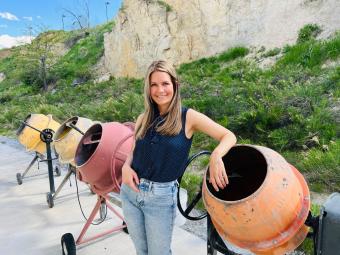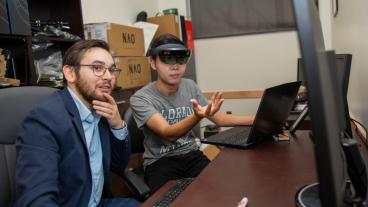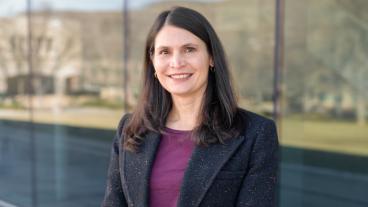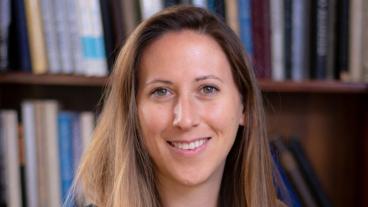Lori Tunstall wins NSF CAREER Award for research on concrete sustainability and durability

Lori Tunstall, assistant professor of civil and environmental engineering at Colorado School of Mines, has received a National Science Foundation CAREER Award for her work on improving concrete durability with a focus on sustainability.
“The longer the concrete lasts, the less frequently it needs to be replaced, which reduces the demand for cement,” Tunstall said. “Some studies have indicated that if you can get concrete to last 100 years, its carbonation over time will offset its own CO2 emissions.”
The $668,200 award from NSF covers five years of research, in which she’ll work on a novel way to “trap” air bubbles in concrete to protect against freeze/thaw damage and encourage others to learn more about their possible future in the concrete industry.
Here, Tunstall answers some questions about her research and how it could impact the future of materials used in construction.
Q: What is your latest research focused on?
Lori Tunstall: This project is primarily focused on improving concrete durability by improving its frost performance. To do that, I’ve proposed looking at a new way to entrain air in concrete. To protect concrete against freeze/thaw damage, we purposefully entrain about 6 percent air by volume into the concrete. Historically, that’s been done with something they call air-entraining agents, which is just a commercial formulation of surfactant molecules that protect the air bubbles and help them persist in a concrete mix so that you get a good air void system when the concrete hardens. However, it’s become less and less reliable as the concrete mixes have gotten more complex. My work proposes using something called Pickering stabilization, or particle-stabilized air bubbles, to entrain air in concrete instead.
Q: What do you find most exciting about your research?
Tunstall: The proposed work requires me to develop a new expertise that I’ve been wanting to develop for a while, which is molecular dynamic simulations. Since I study air entrainment and a lot is happening at the molecular scale, it’s difficult to study directly. Molecular dynamic simulations will empower me to understand more about the material and make more informed strides in making the material better. That’s not something that I’ve developed an expertise in before, so this project will give that chance.
Also, particle-stabilized air bubbles are something the food industry has used for a long time, and I just think it’ll work for concrete. I’m interested in exploring it further just to test the hypothesis that it’ll work better than what we’ve been doing. And if that hypothesis is true, then it allows us to really change the way we entrain air in concrete, which will make it a lot more durable against freeze/thaw cycles.
Q: What is the potential impact of this work?
Tunstall: If we prove the hypothesis, then one, I think it’ll change the way that we entrain air in concrete, which should make it a lot easier to maintain a good quality air void system with new materials without sacrificing its frost durability. And then, if that’s true, it just opens up a big possibility for other materials that can be used. So, for example, the industry often uses fly ash as a partial cement replacement, but it limits the amount of carbon that can be in the fly ash, because it’s been shown to interfere with air entrainment. If we have an air void system that’s really robust and can’t be interfered with from other materials, then it could offer a whole wide range of materials that we’re not using right now. These materials might have been previously considered too poor quality to use in concrete. But there could be broader possibilities for recycled materials, for other waste streams, and it just offers a lot more versatility potentially.
Q: How does this research agenda inform your teaching?
Tunstall: Part of the project will be focused on having students do some of the research to verify some of the results we’ve gotten, so we’ll be using that information. I’ll also get to share with students some of the cutting-edge things we can do in research to improve concrete durability. I teach a course on durability of concrete, so I’m really well positioned to explore cutting-edge research in that field. Not only will I be able to teach students new ways in which we can approach these old problems, but the students themselves will actually get to contribute to the new research, which I think is a great way to learn and also just a nice synergy between research and education.
One of the things I’m most excited about is the opportunity to introduce a lot of students to careers in concrete. I’m particularly focused on recruiting young women into the concrete industry. As you can imagine, we’re pretty poorly represented still. I have a lot of local contacts in the industry, and they’ve all agreed to participate in this annual accelerated career introduction program. These different industry professionals will be offering a tour to these young women to expose them to different career opportunities, and they’ll be exposed to precast concrete, ready mix concrete, construction, research in my laboratory and advanced concrete testing. That’s one of the things I’m most excited about because I just think it’ll be something that I would have enjoyed as a female engineer, to just understand what career options are available. A lot of times we just focus on the most traditional paths forward and working with concrete as a material isn’t necessarily top of mind. But it’s been a really rewarding career for me, and I think it will continue to be so. As an industry, we’re trying to reduce our carbon footprint and I think there’s just a lot of fun opportunity there for innovation. I wish I had been exposed to it earlier and I think this will be a fun opportunity to do that for others.




